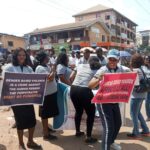Among the 133 million Nigerians living in multidimensional poverty, public health specialist Nkiru Ezeama estimates that around 44% of women and girls cannot afford to buy sanitary pads, which costs at least N500
This is, of course, in addition to the pain and discomfort associated with the periodic flow of blood from the uterus. Around 52 per cent of Nigeria’s female population experiences menstruation, according to Health Aid for All Initiatives.
In the past, rags and other soft clothing materials were commonly used to absorb the menstrual flow among Nigerian women of reproductive age. However, in recent times, sanitary pads have become an ideal alternative, offering more comfort and posing no risk to health.
In spite of this, sanitary pads remain out of reach for many adolescent girls, who resort to wedging pieces of rag between their thighs and dealing with the countless stares from strangers at their blood-soaked dresses.
Blessing Olaniyan was one of such girls who struggled to procure menstrual pads in her adolescence.
“While growing up, I saved every cash for myself to the extent of going hungry, combining the feeding money to have a pad for the month. In my adolescence, I remember meeting with some teen girls who said they asked older boys in the neighborhood for money, and, in return, they would often ask for a relationship or inappropriate physical contact,” she recounted.
When Olaniyan began working at the General Hospital in Kwara State as a registered nurse, she would notice the same crisis among most of the teenage girls she encountered.
“I noticed there were many girls experiencing teenage pregnancy. Upon researching, I discovered it was often linked to poverty, including period poverty. So, I decided to educate them on sexual purity and provide sanitary pads,” she said.
Thus, in June 2021, Olaniyan founded the Peculiar Generation Foundation to address the menstrual needs of female teenagers in Nigeria.
“I noticed that due to a lack of money to buy pads, their mothers instruct them to use clothes, which they are not comfortable with. Consequently, they often beg for money, and most of the time, the individuals available to provide assistance are young guys and men.”
Owing to this, randy men cash in on the young girls’ desperation and propose sex to the girls “as if it is an exchange,” Olaniyan explains further.
Drawing on her earlier experiences with period poverty, Olaniyan dedicates part of her monthly salary to help these girls procure sanitary pads and avert unwanted pregnancy. .
Olaniyan’s outreach has spread to girls in more than three schools in the Nigerian state of Kwara, including Isanlu Isin Grammar School.
“Whenever we visit the schools, we usually provide sanitary pads that are typically sufficient for a month. More than 500 secondary school girls have benefited from the organization,” Olaniyan said with pride.
Recently, Olaniyan had to move to the city of Abeokuta for further studies. This, together with the increase in the cost of sanitary pads due to inflation, has affected her tours to these schools.
As she said, “We have sought donations, but they have not been forthcoming.”
Among the 133 million Nigerians living in multidimensional poverty, around 44% of women and girls cannot afford sanitary pads, which cost at least N500. This leads to many using rags, causing great discomfort and health risks. The cost issue drives some girls to seek money from older men, often resulting in exploitative situations.
Blessing Olaniyan, a nurse, faced similar struggles in her adolescence. She founded the Peculiar Generation Foundation in June 2021 to provide sanitary pads and educate girls on sexual purity, linking teenage pregnancy and period poverty. She has helped more than 500 secondary school girls across different schools in Kwara State, though challenges like inflation and her relocation have affected her outreach activities recently.






